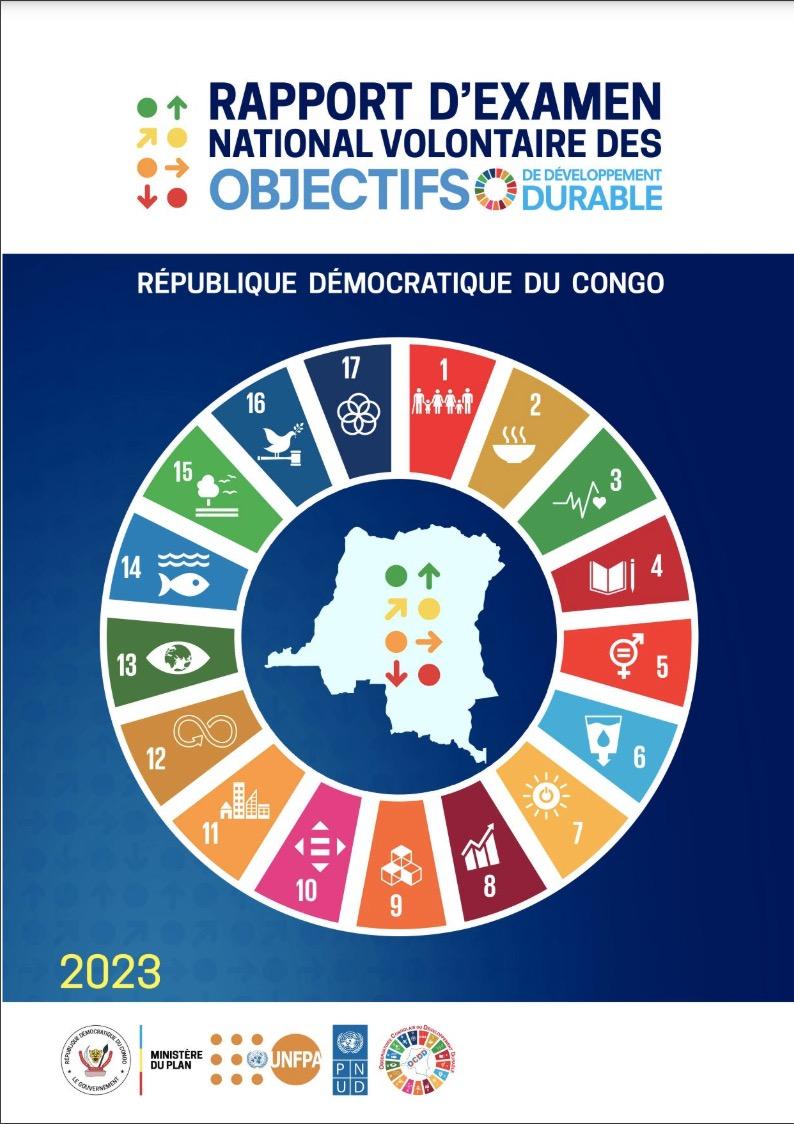Democratic Republic of the Congo Voluntary National Review 2023
The Democratic Republic of Congo is not on a good trajectory to achieve the SDGs. COVID-19 has further delayed or even wiped out the progress made. Thus, to respond effectively to the challenges linked to the implementation of the SDGs, the Government is committed to structural transformations and the implementation of solutions guided by the SDGs. On the social level, the DRC is implementing the reform on universal health coverage. For a country where catastrophic health expenditure is very high, this reform constitutes a springboard to remove millions of Congolese from vulnerability. Large-scale actions have been carried out to fight against mass diseases such as Malaria and HIV, with particular attention to prevention. Appropriate measures are also taken to strengthen social protection. In the education sector, in order to recover millions of children previously excluded from the system due to very high fees, the DRC has made basic education free and measures have been taken to strengthen this free education. Access to water and electricity remains at worrying levels in the DRC, mainly in rural areas. To respond effectively to these challenges, the Government has liberalized both sectors. Unlike the water sector where progress remains very timid, major progress has been recorded in the electricity sector. The share of private companies has remained increasing over the last three years and the outlook is good. Unfortunately, endemic poverty in rural areas does not encourage private initiatives. And this is where the State's action is currently focused. Dependence on natural resources constitutes one of the characteristic features of the DRC economy. The growth remains largely attributable to the good performance of prices. The post-COVID-19 recovery is an illustration of this. This constitutes a real weakness by exposing the country to the volatility of commodity prices. To diversify the economy and provide the country with a dynamic, competitive industrial fabric that is responsible for the environment and sustainable development, the DRC has launched the establishment of six Special Economic Zones (SEZs) across the national territory. divided into six industrial zones. There is no doubt that the DRC is a major player in the fight against climate change; a solution country with real assets. The Government is working to save forests and fight climate change. As part of COP 26, the DRC revised its commitments to reduce greenhouse gas emissions from 17 to 21% by 2030. However, it is clear that for greater efficiency, the Government will need to invest in the data and information collection system. The Congolese Government remains aware that development actions and strategies must be anchored at the local level for greater effectiveness. With this in mind, the Government launched the Development Program for the 145 territories (PDL-145T). This is a Program targeting 145 territories in order to increase the public provision of basic social services, improve the resilience of local populations and strengthen public institutions at the local level. The implementation of the SDGs in the DRC is taking place in a context of conflict and instability, mainly in the eastern part of the country. Several armed groups operate there to this day, the main ones being the M23, the ADF and CODECO. These groups have been at the root of several incidents: violent deaths, kidnappings, destruction of the local economic fabric, destruction of critical infrastructure and other assets, massive displacement of the population, etc. The activism of these armed groups has also greatly deteriorated the humanitarian situation. And this has led to an increase in the population's needs for humanitarian aid. The proportion of the population in need of humanitarian aid has seen a significant increase of more than 73%, from 15.6 million in 2019 to 27 million in 2022. With a number of internally displaced people exceeding 5 million, the DRC remains one of the countries with a high proportion of internally displaced people on the African continent. It should be noted that efforts at the national, sub-regional and regional level are being undertaken to put an end to the conflicts in the eastern part of the DRC. It is clear that in the current context, achieving the SDGs remains hypothetical.

